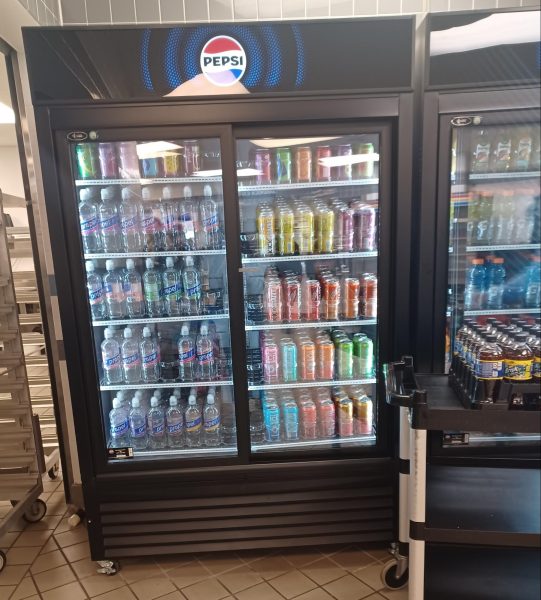Drug of choice: fast food
Michael Ventralla, 31, was the heaviest contestant ever to perform the most dramatic amount of weight loss ever seen on NBC’s hit TV show “The Biggest Loser.” On the start of the 2010 season, he weighed a shocking 526 lbs and by the season finale was a slim size of 262 lbs.
“It’s been like a bad car crash. Everything happened so quicakly and I’m like in shock,” Ventralla said
Food was a constant struggle, which led Ventralla to get to this outrageously unhealthy place. Ventralla’s transformation amazed all of America, as they watched his journey to a healthier life style. Not only did Ventralla lose the most weight on the show but he lost a whopping 34 lbs the first week.
He openly admitted that eating out and portion control were his main problems.
With fast food quickly becoming the way of Americans, it is crucial that the American people know the outcome if it is not eaten in moderation.
Cost
Lompoc Valley Community Health Improvement Project found that the average cost of a fast food meal is $6.00.
If one person in your family ate one fast food meal 5 days per week that would add up to a whopping $1500 a year. For a family of four, one is looking at the astonishing number of $6000 a year if this average size family ate out just one time a day at fast food dining. Many Americans would claim that this is outrageous, but in the moment it seems very quick and cheap.
“When I’m out with friends or am doing something, now that I have my license it is just a lot more convenient to stop real quick and get something then to go all the way home,” junior Ben Barnes said.
When we account for the cost of buying groceries and ready to eat food products the family will eat at home, we can add on an additional $3400 a year. For $9400 this family gets slightly more convenient food that is less nutritious – and ultimately more expensive.
The food industry’s benefit from the loss of cash in the pockets of fast food goers. In the year of 2011, McDonalds corporation made $34.2 billion off sales. To put it in perspective, Wendy’s had $8.5 billion in sales and Burger King came in close behind with $8.4 billion in sales, according to USA Today.
Preparing meals at home may take longer, but the long term benefits are much greater with the amount of money saved and encourages healthy habits.
Depression
According to a recent study headed by scientists from the University of Las Palmas de Gran Canaria and the University of Granada, maintaining a high percentage of fast food consumption is linked to depression. Published in the Public Health Nutrition journal, the results of the study reveal that consumers of fast food, compared to those who eat little or none, are 51 percent more likely to develop depression.
This ignited scientist Almudena Sánchez-Villegas from University of Las Palmas de Gran Canaria to lead a study in hopes of informing the world of the serious long term effects of consuming fast food.
Sánchez-Villegas is the lead author of the study that demonstrates that those participants who eat the most fast food are more likely to be single, less active and have poor dietary habits which is a significant factor in what causes depression.
The study sample involved 8,964 participants, all of which have never been diagnosed with depression nor have never taken any medication for depression. After assessing the participants, 493 were diagnosed with depression. Some also began taking anti-depressants.
“The past doesn’t define you, your present does. It’s okay to create a vision of the future because it affects your behavior in the now,” fitness trainer and health coach Jillian Michaels said.
Depression affects 121 million people worldwide. This figure makes it one of the main global causes of people mentally being incapable of sustaining their peace.
Obesity
Depression is an epidemic in today’s society, and it’s not surprising when correlated with the obesity crisis unfolding, not just in America, but in a variety of countries all over the world.
With Americans now consuming 31 percent more packaged food than freshly prepared meals, the increase in weight gain has been rapid. According to the Super Size Me website, eating just one meal out at a chain restaurant contains almost an entire days worth of calories and fat. Many people do not commonly realize exactly how unhealthy the food they are eating really is.
On almost every corner of a main street a fast food restaurant can be found, especially the big food chains such as Subway, McDonald’s and Starbucks.
“I think weight gain and obesity are due to the common trend of eating fast food because they’re are very few items on the menu that are healthier but even those choices aren’t going to differentiate the fact that it is still fast food,” senior Justin Diddell said.
Weight Gain
Bastyr Center for Natural Resources says that weight gain and obesity are now an epidemics in the United States, affecting two out of three adults.
The proportion of overweight children is also increasing at an alarming rate, growing 50 percent in the past ten years to about 15 percent.
Fast foods are generally high in salt, fat and refined carbohydrates, and low in vitamins and minerals. Additionally, studies have found that portion sizes of prepared foods and fast foods have increased in the thirty years that obesity rates have skyrocketed.
It is estimated that more than 10 percent of the food consumed by children is fast food. Several studies have found that high intake of fast food is linked to high body weight.
Ventrella is just one example of the millions of Americans facing weight gain everyday. For Ventrella there weren’t any viable choices left.
He was 30-years-old when the show began, and had tried every weight-loss fad diet, pill and magic potion there is. None had worked.
Exercise was the only thing that was going to give him his life back.
“At 526 pounds, nobody at that weight can ever feel any sense of hope,” Ventrella said.
Addictive habits
Scientist have previously proven links between drug addiction and fast-food addiction, but now there is a growing body of research that is finding out how junk food is hard wiring our brains for cravings.
The latest study, published Mar. 28 in Nature Neuroscience, according to Paul H. Kenny, the effects of high-fat, high-calorie fast food are linked to those of cocaine or heroin. The hypothesis was tested on animals and the results proved that the study prediction was accurate.
Not many people are able to pull themselves out of their habits once they become such a big part of their life.
“Fast food can definitely become addictive eventually if it is not eaten in moderation,” sophmore Jake Marzcuk said.
It’s by far a lot easier to just put the problem off and continue with what is part of everyday life then to change. The greasy food is a lot more tasty to most then a low carb healthy meal.
For many Americans, food occupies a central position of their world, but like anything these addictive habits can be broken with a strong support team and the drive to put in the work to reach the goal.
“We’re an Italian family. We make food an event. It’s an occasion for all of us,” Ventralla said.
Changes need to be made slowly but effectively, staying true to the diet and exercise plan is keen to success.

Grade: 12
About their position: The design/content manager deals with the visual aspects of the Krier. Along with looking over the design, Katrina will...







